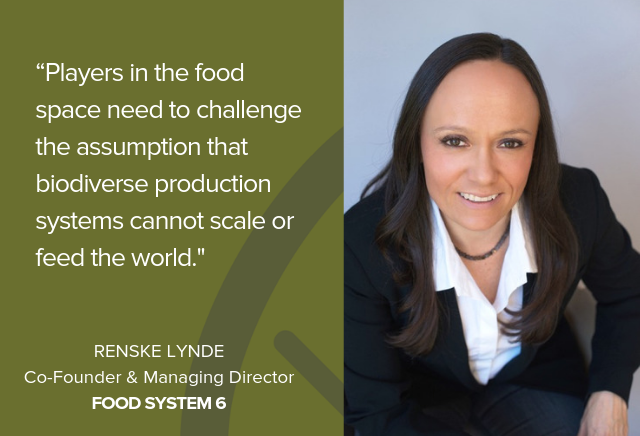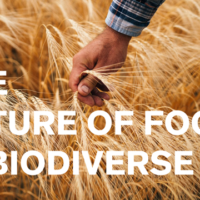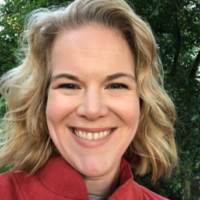
From January 7 – February 8, Food+Tech Connect and The Future Market are hosting Biodiversity: The Intersection of Taste & Sustainability, an editorial series featuring interviews with over 45 leading food industry CEOs, executives, farmers, investors and researchers on the role of biodiversity in the food industry. See the full list of participants and read about why biodiversity in food is important here.
Smart capital and innovation ecosystems that prize diversity are key to creating a regenerative, biodiverse future at scale. For Food System 6 (FS6), a non-profit accelerator that helps food and agriculture entrepreneurs and organizations accelerate their growth and impact, both genetic diversity among plants and animals and cultural diversity in the entrepreneurial ecosystem are critical to creating regenerative food systems.
Below I speak with Renske Lynde, co-founder and managing director, about the incubator’s holistic approach to supporting innovation among farmers, producers and entrepreneurs. True systems change, she argues, requires long term investment from investors, foundations and VCs. Current capital structures could scale biodiverse and regenerative agricultural systems, they just require more patience and greater investment in infrastructure and processing.
_______________________
Danielle Gould: Is biodiversity a priority for Food System 6? If so, how and why?
Renske Lynde: Biodiversity is the cornerstone of a healthy, thriving ecosystem; therefore addressing biodiversity is one of the fundamental facets of building a healthier food system for all, which is our core mission at Food System 6.
We take a view that all levels of biodiversity – genetic, species and ecosystem – are critical to the thriving, interconnected and complex system that makes life on earth possible. For us, creating a Sixth Food System is about ensuring that the planet can continue to sustain future generations and we believe that biodiversity moves beyond sustainability and, as such, is foundational to building regenerative systems.
DG: How does Food System 6 define and think about biodiversity?
RL: Biodiversity is a multifaceted issue within the FS6 program, as we focus our curriculum around the interconnectedness of each of the complex factors influencing the overall ecosystem. In an attempt to simplify an inherently complex issue, we can break the FS6 perspective into two distinct, yet deeply interrelated categories: genetic diversity amongst plants and animals and cultural biodiversity throughout the entrepreneur ecosystem.
The first issue – plant and animal biodiversity – is one that has been gaining traction across the food ecosystem recently. With the increased selection and hybridization of organisms for traits like stability and growth, much of the industrial food system has de-prioritized previously crucial elements like nutrient density. As our food’s ability to nourish us diminishes, larger quantities are needed to fulfill us, and more additives are necessary to supplement for flavor. Not to mention the increased use of chemicals and hormones necessary to maintain the health of an increasingly fragile genetic ecosystem. We have traded in traits like natural pest resistance and immunity for more commercially attractive attributes like growth rates and product size.
From monocropping to genetic modification selective breeding, we are jeopardizing our ability to have an adaptive and regenerative food system, even as we watch the world around us change drastically and with increasing speed. On the bright side, there is a growing trend in innovation to focus on this issue through the breeding and selection of heritage breed plants and animals. Companies like Emmer & Co, Row 7, Sfoglini and Heritage Foods are playing an important role in bringing the conversation of genetic diversity to the table.
Perhaps a more nuanced, but equally important aspect of this conversation, is that of diversity within the entrepreneurial landscape. The biodiversity of community is just as essential to healthy ecosystem growth as genetic diversity is to the long-term viability of agricultural crops. Core to our program is the understanding that economically, racially and culturally diverse ecosystems build richer and more robust environments for innovation. The research is continuing to show that diverse organizations have increased productivity and profit, broader networks and advanced consumer insights; additionally, diverse teams have been shown to iterate faster and smarter than their competition. There has also proven to be a strong connection between native communities worldwide (who tend to have a stronger connection to natural systems) and those that are actively focused on promoting biodiversity. Companies such as Tanka Bar, Native Harvest and Extensio are examples of solutions that address both sides of the equation by supporting marginalized communities and creating market opportunities for biodiverse, culturally relevant products.
DG: What is Food System 6 doing or planning to do to promote biodiversity?
RL: Farmers have long evolved crops to produce an amazing diversity of plants that are naturally pest resilient and capable of producing life-sustaining nutrition. It is our mission to surface and support those who are doing so in a holistic and systems-focused manner. Thus, the FS6 portfolio supports a culturally, racially and socially diverse selection of farmers, producers and entrepreneurs who are innovating around the ideas of regeneration in the food and agriculture ecosystem.
DG: What is the business case for products that promote a more biodiverse food system?
RL: The business case is simple: without biodiversity, we will see the extinction of our food system as we know it … and we are already seeing signs of the collapse. Monoculture production has become a global hazard for all and, as such, addressing biodiversity is much more about making a case for humanity’s survival than it is about food politics. As the climate warms and weather patterns become more severe, we will continue to see even greater crop damage and loss. Increasingly, we are seeing that companies have recognized that sustainability matters and that protecting and promoting biodiversity is a necessary next step in securing supply chains in a quickly changing world. However, the major players can (and need to) play a bigger role in reversing the damage caused by monoculture production by building diverse supply chains that mitigate against losses. We must adopt new models for business that take into consideration the true cost to the environment and its inhabitants.
As an example, investing in factory farming has become a value destructive decision because we know that poor animal welfare leads to an array of major supply chain problems like swine flu or fraud. By examining the opportunities to invest in solutions that promote species and production diversity, we can secure supply chain investments that may have a longer horizon but over time lead to value creation across the entire production and consumption value chain.
DG: What investments need to be made to create a more biodiverse food system?
RL: There is significant work happening in agroecology and wildlife conservation to create more biodiverse ecosystems. There are many Native American Tribes working to save diverse seeds and bring these indigenous products to the market. We are seeing new and safer technologies for seed breeding and hybridizations; agronomists are identifying wild seeds that are suitable for small and medium scale cultivation. Regenerative and biodynamic farming practices are becoming a part of large food companies land holdings – albeit on a very small scale. Heritage animal breeds are being revived as their benefit to habitat reconstruction and overall role in a healthy ecosystem and diet becomes better understood (more specifically, for their nutrient density and role they play in grassland reconstruction).
With all of these innovations in the ecosystem, we need to take a less reductionist and extractive approach to investing in, and creating new, ecosystem-based markets. For instance, quinoa – the beloved superfood from the Andes, has seen a sharp rise in demand over the last 20 years, leading farmers to abandon the nearly 3,000 varieties that farmers have developed over centuries of cultivation – in favor of a few to satisfy the export market. It is untenable farming practices like this that endanger the seeds and plants that are essential to life. Investments need to take a holistic view regarding the assets and resources that are required to enable biodiversity to flourish and we need to see more investment in the infrastructure and processing elements that will support biodiverse foods. One of the ways that this can happen is by focusing on and investing in right-sized innovation in the food and agriculture space, rather than furthering the practices that produce higher yields for a only a handful of crop species. This requires us to think about innovation beyond the emerging technologies that are sexy and exciting and to focus instead on building solutions that address the needs of small to medium scale production and regenerative applications.
DG: How might we reinvent capital structures or create incentives to create more investment in biodiversity?
We don’t necessarily need to reinvent capital – if leveraged in the right way, the current capital infrastructure can be used – we just need to start investing in some of the products and services that are in alignment with these objectives around biodiversity. Ultimately, what we need is for the gatekeepers of philanthropic capital to start leveraging their knowledge and networks in order to support and scale innovations that are building biodynamic and regenerative practices. If the traditional investors, foundations, and VCs could join forces, we could revitalize our capital infrastructure to support the complex needs and longer ROI cycles of regenerative agriculture. The philanthropic leaders who have been advocating for biodiversity should be supporting these companies and engaging in market-based solutions to scale them; the investor community should be revising their metrics of success in order to accommodate for the more holistic returns associated with regenerative investment opportunities.
From a policy perspective, we need an increase in the incentivizes and mechanisms that promote these kinds of shifts in production – as we have seen around the conversation of soil health in California. We need to expand policy dialogue, across the board, to include incentives that promote biodiversity.
DG: What are some of the most important things investors, food manufacturers, retailers and other key actors across the supply chain can do to support biodiversity?
RL: Players in the food space need to challenge the assumption that biodiverse production systems cannot scale or feed the world. We need to recognize the importance of diversity within the entrepreneur, investor, and farmer ecosystem and to interact with all stakeholders to advance change; where this is not possible, we need to support the kinds of intermediaries that function at the edges of the stakeholder ecosystem to help support innovation with these goals in mind. Lastly, we need to stop investing in innovations that do not prioritize impact and transformation.
DG: Are there certain products you would like to see more of in the food industry — either in foodservice or CPG — that would help promote a more biodiverse agricultural system?
RL: The biggest step that we could take in the direction of a more biodiverse ecosystem would be to increase the diversity of all staple crops and bring back genetic diversity of grains. Adjacent to that, we need to promote the proliferation of heirloom varietals and animals and integrate them into products that the consumer will be able to find on the average grocery store shelf.
Read all of the interviews here and learn more about Biodiversity at The Future Market.
_____________________________
 Renske Lynde, Co-founder and Managing Director of Food System 6
Renske Lynde, Co-founder and Managing Director of Food System 6
Renske Lynde has worked in the non-profit sector on food, agriculture and nutrition policy issues for nearly 20 years. Her work has included grassroots education and community organizing, strategic campaign development, quantitative policy analysis, and legislative advocacy. She began her career in Minneapolis, Minnesota at the Institute for Agriculture & Trade Policy working on behalf of small-scale sustainable agriculture producers and went on to build direct markets for Pennsylvania farmers in the Philadelphia marketplace. Renske subsequently directed Advocacy and Research for the San Francisco Food Bank working primarily on cross-sector partnerships to improve the federal food stamp and school lunch programs. She holds a BA degree from Boston University in Political Science and Psychology and a Masters in Public Policy from UC Berkeley’s Goldman School of Public Policy.
Renske is a Co-Founder and Managing Director of Food System 6, a non-profit, impact-focused accelerator based in the Bay Area that supports mission-driven entrepreneurs who are transforming how we grow, produce and distribute food. FS6 runs a 4-month cohort program that is designed to meet the individual needs of each of the accepted portfolio companies accepted and currently has an active portfolio of 23 companies working all throughout the value chain from on-farm innovations to consumer products.
FS6 collaborates with a wide range of partners and supporters across philanthropy, the investment sector, and with companies such as Annie’s and Google. FS6 is working to elevate the concept of blended capital to scale impact in the food system and to develop innovative financing approaches for its entrepreneurs.
Renske is also an active impact investor and philanthropist in the food system, and a member of Toniic, an impact investing group.





